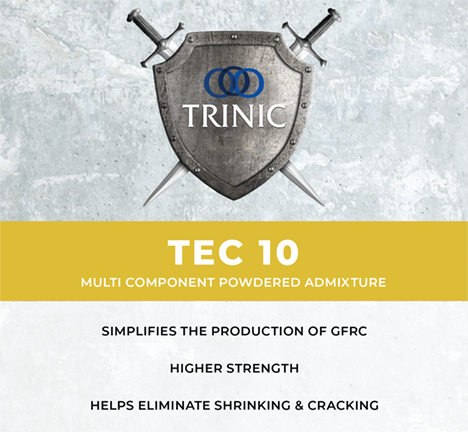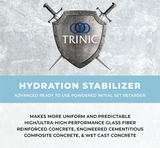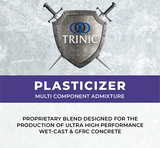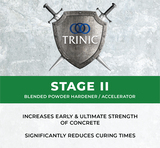
GFRC Admix TEC 10 - Trinic
GFRC Admix Tec 10 – Multi Component Admixture
TEC 10 makes creating with GFRC easier than ever. TEC 10 allows you to dose a single component admix that provides a curing polymer specifically designed for GFRC without the issues associated with a liquid polymer. TEC 10 is designed to maximize shrinkage reduction thus almost eliminating curling, shrinkage cracks and crazing due to variances inherent to portland cement and dry sands.
The exceptional strength added with the use of TEC 10 averages 25%-50% above conventional additives (proven by independent testing).
TEC 10 is a full admix package so there is no need to dose several different additives. TEC 10 can be used for spray up applications for both face and backer coat as well as SCC/ ECC / Direct cast by adding Trinic Plasticiser.
Dosage Recommendations:
Factors affecting Trinic GFRC Admix dosage:
With some understanding and a little experimentation you can produce GFRC that is super high performance and virtually free from pinholes, crazing, bowing, and curling. You will be able to spray verticals or make self consolidating GFRC just by varying the dosage of admixture.
Water demand:
- Cement type – Different cement types will have different water demands to reach the same slump. Not just white or grey but cement from different mills will react differently.
- Sand – The size of the sand grain and the sand type both have an effect on slump. Generally the finer the sand the higher the water demand.
Calculating you water to cement ratio:
- The water to cement ratio is the total water divided by the total cementitious content.
- The water in the sand or the absorption factor of the sand must be accounted for in order to calculate and accurate water to cement ratio.
- Extremely wet sand can contain up to 10% moisture.
- Dry sand can absorb up to about 1.5% of its weight in water. This is known as satisfying the sand’s absorption factor.
- The sand absorption is largely responsible for the false set you may experience.
- Example with dry sand:
- 30 pounds sand, 30 pound cement how much water gives you a .3 w/c ratio?
- 30 pounds cement * .3 = 9 lbs water.
- 30 pounds sand with an absorption factor of 1.5 = .45 lbs. of additional water to satisfy the sand’s absorption.
- Adjusted water to achieve a .3 w/c ratio = 9.45 lbs.
Mix designs:
GFRC mix ½ cf.
- This is enough to produce 8 sq. ft. of GFRC ¾” thick. The back coat is just face coat with glass fiber dosed in the range of 2% to 4% of the
total dry weight of the batch. We use 3% for most applications.
Portland Cement – 30 lbs.
- We recommend white Portland. Different cements will react slightly differently to Trinic admixtures.
- You can replace part of your Portland cement with a pozzolan to make greener GFRC, we recommend bright white silica fume from Trinic.
- Always make a test batch prior to production runs.
Sand- 30 lbs
- Sand graded anywhere from 30 grit (fairly course) to 70 grit (very fine) can be used for GFRC.
- We recommend starting with a 40 grit sand for facecoats and backcoats.
- The finer the sand the higher the water demand.
- You may need to offset thirsty fine sand with additional Trinic plasticizer.
Water – 9 lbs. or 1.08 gallons
- This will give you a water to cement ratio of .3 which is a very good starting point. If you use a little more water that’s ok, if you use less
water great, if it looks like you need a more flowing mix on a flat surface, add more Trinic plasticizer rather than water. - You can add up to an additional 1 % (of the cement weight) of Trinic plasticizer to make a self consolidating GFRC mix, start with .25% and work up from there as required.
Trinic GFRC Admix – 3% of the cementitious as a starting point up to 4% if needed
- 3% of 30 lbs. =.9 lbs.
Our Suggested Facecoat/ Sprayable Mix Design:
We Also Recommend






